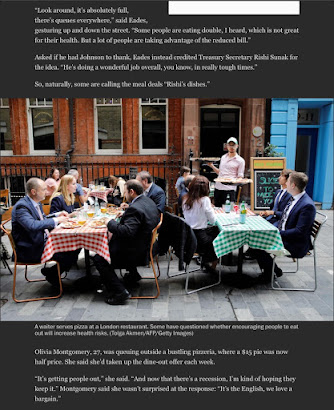I generally don’t bother to educate myself very much with UK politics unless I have work papers to write or an academic reason to do so. Having studied the excruciating differences between the evolution of the UK parliamentary and elections systems versus ours, which is modeled on the Westminster system, I have no wish to incur an enormous migraine by trying to understand Brexit, UK voters, and well, Boris Johnson.
However, scrolling through The Washington Post that day, a headline written by William Booth and Karla Adam published on August 21 caught my eye, ‘Boris Johnson is splitting the check with millions of Britons who dare to dine out’. Hmmmm. Well. British state debt has hit £2 trillion due to the measures put in to see the economy through the coronavirus crisis, a figure that is set to rise. VAT has been reduced, and businesses have been allowed to delay rents till September. Nobody knows what autumn and winter will bring.
The world’s retail and restaurant industry (along with theatre, events and the arts, et cetera) are suffering from COVID-19 closures and social distancing rules. The entire global economy has taken a hit. It’s terrible for employees who need this paycheck. Even as Singapore eateries have closed from severe losses, we feel it less than UK because our borders are pretty much closed, and the city’s infection numbers are kept controlled for now.
The UK government's 'Eat Out to Help' scheme for the month of August had set aside £500m to help businesses, dished out 64 million co-paid/discounted meals in the first three weeks, and has so far spent £336 million. This amount included school meals, benefiting children and staff whose school terms had started, but the the schools in Scotland that began the term later would have fewer days of benefits.
At the very least, it's encouraging diners to fill the restaurants and cafes and support the businesses for another month. Half of Britain's restaurants are still closed. We don't know how this would work beyond Christmas, or how many would have lost their jobs by then. Chancellor Rishi Sunak has been urged to extend this scheme in the city centre. However, at this point, there haven't been any concrete announcements about the extension of this scheme.
UK schools are gradually reopening and school children will head back to the academic term in September after the summer holidays. UK and the rest of the world fear a resurgence of virus, which has already mutated, when autumn arrives. Traveling is still operating at minimal capacity, but what works for Singapore, will not work for UK, simply because of geographical size.
They say there's no free lunch. But in Britain, Prime Minister Boris Johnson is willing to split the check — for the entire country.In an audacious (panicky?) scheme designed to save the country’s flagging hospitality industry and tempt people fearful of the coronavirus out of their home-bunkers, the British government is offering half-off on fish and chips — and everything else on the menu, sticky toffee pudding included.When the program was announced a few weeks ago, many were skeptical. They smelled not English sausage on the grill, but desperation, while Britain plunged into deep recession, the worst in Europe.But the “Eat Out to Help Out” campaign, as it is officially known, has been wildly popular. In its first two weeks, the government has subsidized more than 35 million meals at 85,000 participating eateries.
I'm not really interested to compare this particular UK measure to what our Singapore government can do. Every city is motivated in different ways. We've been given cash handouts and such, and to me, that's more than sufficient. We can't bankrupt our government. Our reserves have been used, but it shouldn't be depleted. Obviously our government's measures lean towards helping businesses stay afloat, making rental rebates compulsory, tax cuts and workers' subsidies. Most restaurants are felled by rents, then a lack of manpower.
I'm more interested to find out about our fellow residents' attitude towards dining out. I don't think Singaporeans cook or bake that much at home. Anecdotal evidence suggested that now, while we do a lot more cooking, and we don't love takeout all that much, the demand for tingkat delivery services is high. Dining out is still something to be looked forward to; the queuse are back at the carparks and the restaurants. It's a chance for lesser restaurants to close. 'Lesser' in the sense of not just offering sterling food, but if it's the entire business operations that can't be streamlined, and hence, it closed.
Everybody says 'cooking at home is healthier'. But I don't actually think so. We can find healthy food offered at the restaurants. We just have to be discerning in picking out what goes into our stomachs. Our restaurants and government certainly don't offer a discount when it comes to meals, so that's not going to spark a craze in long lines at Shack Shack for its burgers. Heh. I thought that Singapore just goes for bubble tea, chicken rice and bak chor mee. LOL
It also has not escaped notice that the “Eat Out to Help Out” campaign was announced the same week the prime minister launched Britain’s latest effort to curb obesity.Britain is the most overweight country in Europe — and the overweight are more at risk from the virus, doctors believe. “I was too fat,” Johnson said, about his physique back in April when he was hospitalized with covid-19, the disease caused by the novel coronavirus.And so the government ordered that junk food advertising be limited and restaurants and pubs required to post calories for food and drink.At the same time, Johnson’s government announced that anyone who wanted to eat cheeseburgers (or kale salads) at a restaurant would have the meal subsidized by the taxpayer.


No comments:
Post a Comment